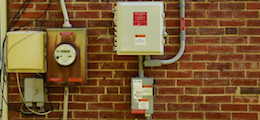Mon Power issues sham competitive process to increase rates and bail out its parent, FirstEnergy

At the close of business on Friday, December 16, Ohio-based FirstEnergy’s subsidiary, Mon Power, announced that it is seeking bids for additional power plant capacity. This request for proposals (RFP) is a sham that is rigged to get the parent company’s preferred outcome, the transfer of the Pleasants power plant to MonPower. This transfer would put West Virginia ratepayers on the hook for FirstEnergy’s unprofitable power plant.
FirstEnergy executives have stated multiple times this past year that they want the Pleasants power plant to be transferred to Mon Power. They want to do this because the Pleasants plant must compete in a regional power market where it is operating at a loss for FirstEnergy. Transferring ownership to MonPower would put the plant in a regulated market. This would shift the plant’s financial risks onto Mon Power and Potomac Edison customers, while ensuring profits for FirstEnergy and its shareholders. The Pleasants power plant near Parkersburg is currently owned by another FirstEnergy subsidiary, Allegheny Energy Supply.
Mon Power’s RFP is biased to favor the Pleasants plant. In the RFP, Mon Power is seeking 1,300 megawatts (MW) of generation capacity. This is the exact capacity of FirstEnergy’s Pleasants plant. Meanwhile, despite Mon Power’s claims that it will need more capacity in future years, Mon Power also recently announced it wants to sell the Bath County pumped storage plant in Warm Springs, Virginia.
The RFP also directly contradicts claims made earlier this year made by Mon Power and Potomac Edison. The companies argued they did not need to issue an RFP for capacity because they would not face any capacity shortfall by 2020. The West Virginia Public Service Commission (PSC) agreed. Now, however, Mon Power and Potomac Edison are arguing that they will need capacity, and are laying the groundwork to purchase the costly Pleasant power plant next year.
“Mon Power says it needs 1300 MW more capacity– conveniently, the exact size of the power plant its parent company wants to bail out,” said Emmett Pepper, Executive Director of EEWV.
Mon Power has 385,500 customers and Potomac Edison has 137,000 customers in the state’s Eastern Panhandle. This accounts for half of the state’s electric customers. Rates are set for both companies jointly, so costs incurred by Mon Power are borne by both Mon Power and Potomac Edison customers.
“West Virginia customers of Mon Power and Potomac Edison should watch this process very closely since they’ll be the ones footing the bill,” says Karan Ireland, director of WV SUN. “The bottom line is that FirstEnergy has come up with a scheme to boost shareholder profits on the back of West Virginians, since electric customers will be forced to cover all of the plant’s costs plus a guaranteed profit for FirstEnergy.”
As WV SUN and EEWV explain, Mon Power’s RFP has been structured to favor the Pleasants power plant. “Not only does the RFP seek 1300 MW — the exact amount of capacity Pleasants would provide — the RFP favors power plants in a relatively small geographic area, which, not surprisingly, includes the Pleasants plant,” says Pepper. The RFP also excludes a wide array of other options, such renewable resources including solar and wind, or long-term purchase agreements from independent power suppliers.
Also, EEWV and WV SUN question the cramped timeline for this RFP, which appears to favor bids from FirstEnergy subsidiaries that had advance notice of FirstEnergy’s plans. In order to submit a bid, generation owners must submit an initial application by December 23. This short turnaround benefits FirstEnergy. “Five business days, right before a major holiday, discourages competitive bids and undermines the integrity of the RFP,” says Ireland. “By comparison, Appalachian Power gave potential bidders more than three weeks in a similar RFP earlier this year.”
WV SUN is a non-profit that expands access to solar by educating West Virginians about the benefits of distributed solar energy, helping them organize group solar installations, and strengthening West Virginia’s solar policies and its community of solar supporters.
Energy Efficient West Virginia is a nonprofit, nonpartisan organization comprised of concerned West Virginia residents, businesses, organizations, and educational institutions that have come together to promote energy efficiency among residential, commercial, and industrial customers in our state.
